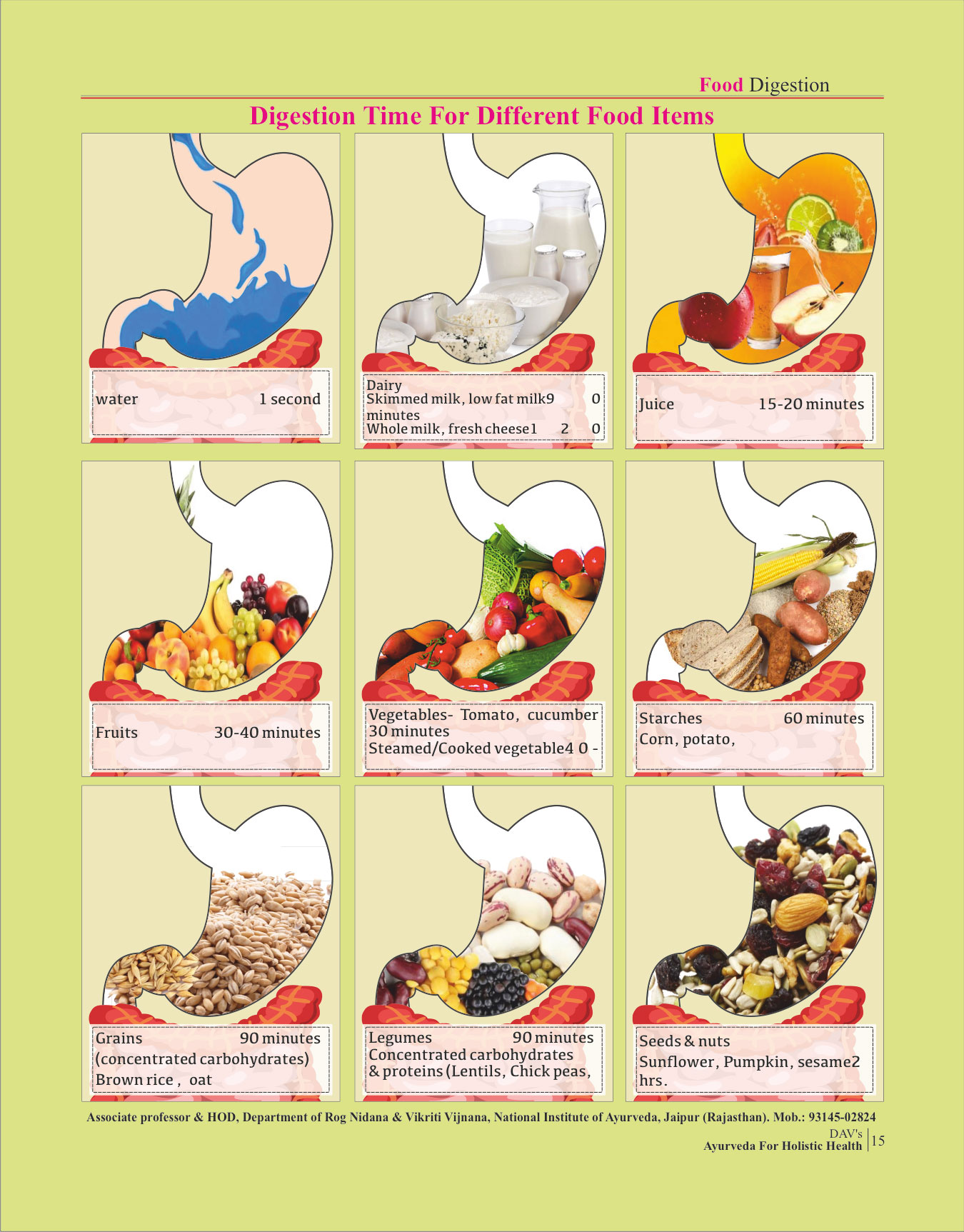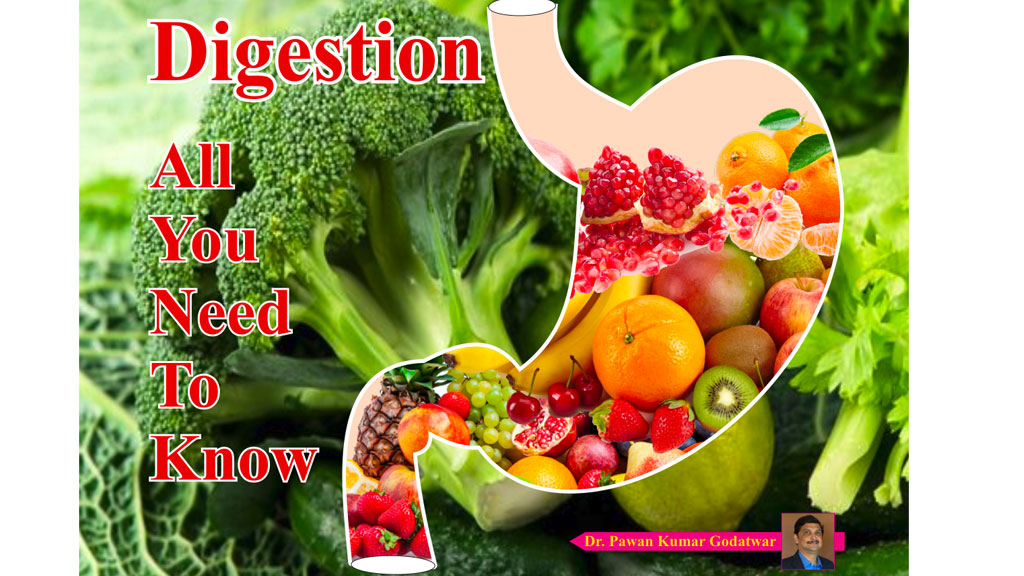Digestion is the process which involves the breakdown of food taken into small molecules which can be absorbed into blood stream providing essential nutrients for the working of body and elimination of unwanted & undigested material out of it. In this whole activity, there is a huge role of digestive enzymes and juices which are specific for the type of food.
Digestion is the process which involves the breakdown of food taken into small molecules which can be absorbed into blood stream providing essential nutrients for the working of body and elimination of unwanted & undigested material out of it. In this whole activity, there is a huge role of digestive enzymes and juices which are specific for the type of food. The process starts in the mouth and ends in large intestines. Most of the absorption is done in small intestines and waste product passes to large intestines and then gets eliminated from anus. It takes 24-72 hours for the food to go through this journey. The exact time depends on the type and amount of the food taken. Overall health of individual also plays a role in food digestion.
Food we swallow reaches the stomach within 8-10 seconds. Liquid reaches with in one second. Carbohydrates are digested more quickly than proteins. Proteins are digested more quickly than fats. So the healthy combination of food promotes good digestion.
Digestion of Different Food Items
Different food items are digested in their own way when they become tiny enough to be squeezed through the intestinal lining into the blood.
Water
Drinking water is an essential component of our health because it acts as a transportation system. It circulates the nutrients throughout the body and removes the waste products. Pure water is a basic compound of hydrogen and oxygen. It cannot be broken down further by the body. It is in fact small enough to diffuse through the lipid layer of intestinal tract into the blood stream and is used by the various organs of the body. When the stomach is empty, it leaves immediately and goes in to the intestines.
Milk
Milk contains all the six nutrients viz, proteins, fat, carbohydrates, vitamins, minerals and water. Milk passes from the stomach to small intestines and then to large intestines. It remains in the stomach for a few hours. Higher fat milk stays for longer duration. If it is low fat then it takes 3-4 hours to leave the stomach and if it is high fat then it takes 5-6 hours. The digestion process takes place in small intestines for over 12-16 hours.
Many people can not digest milk due to lactose intolerance. Lactose is a naturally occurring sugar in milk. Lactase is the enzyme in the body that helps to digest milk. But if this enzyme is deficient, the individual can not digest milk and feels discomfort like bloating, abdominal pain and diarrhea.
Vegetables
Vegetables are the foundation of healthy life. They are important source of many nutrients including minerals, vitamins and dietary fiber. Eating a diet rich in vegetables may reduce the risk of stroke, cancer, heart diseases and obesity. There are two types of dietary fibers in plant food, soluble and insoluble. The vegetables mostly contains insoluble form of fiber named as cellulose. This fiber is difficult to break down by the digestive system if veggies are taken raw and thus cause stomach pain. So they have to be cooked to make easier digestion. This fiber is solid fiber and helps create the bulk of stool. It neither dissolves in water and nor it absorbs the water. Thus it is important to increase the fluid intake while taking the insoluble fiber rich veggies otherwise the fiber stays hard making it difficult to pass and cause constipation.
Vegetables containing soluble fiber can be digested easily. Soluble fiber slows down the time for food to pass through the stomach into small intestines which has the benefit of keeping one feel full for long. It helps to control blood sugar and lipid profile. Soluble fibers in plants are pectin and gum. They form gel like substance when dissolve in water. Soluble fibers retain water and make stool softer & bulkier. They work in both conditions i.e. diarrhea and constipation.
Insoluble fiber Rich Vegetables
Greens- Spinach, lettuce, kale, turnip, cauliflower, asparagus, potatoes. Soluble fiber rich vegetables
Beans, lentils, peas & psyllium husk.
Whole Grains
Whole grains are an important part of a healthy diet. They are composed of fiber, starch, vitamins and minerals. Whole grains such as whole wheat, barley, millet, brown rice and oats retain all parts of the grain unlike refined grains which are stripped of the bran and germ during processing along with removal of many nutrients & fiber. So the body has to work harder to digest all the parts of whole grain i.e. bran, germ and endosperm and make all the essential nutrients available to the body. The body works to break whole grain which boosts the metabolism. This makes the blood sugar rise steadily preventing the fluctuation in its level. Due to high dietary fiber content, the whole grain consumption is associated with lower risk of heart disease and obesity.
Nuts
Nuts provide a balance of fat, protein and carbohydrate. They are high in heart healthy monounsaturated and polyunsaturated fat. They contain antioxidants known as polyphenoles which protect cells from oxidative stress. They are high in fiber and help feel full. The gut bacteria ferment the fiber and turn it into short chain fatty acids that promote intestinal health. These fatty acids are the source of energy for the cells lining the intestines.
Nuts are hard to digest due to phytic acid and enzyme protease inhibitors which are designed to protect the nut plant. Phytic acid is indigestible for humans and affects the absorption of minerals in the gut like zinc, iron and calcium. Therefore soaking is the best method to reduce phytic acid content and make nuts easily digestible.
Nuts with highest content of antioxidants, minerals and unsaturated fat are almonds, pistachios, hazel nuts and pea nuts.
Starch
Starch is the main form of digestible carbohydrates. It is a complex carbohydrate composed of many sugar molecules called monosaccharides which are linked together. During digestion, these bonds must break into the form that can be absorbed into blood. The absorbable forms of starch are glucose, galactose & fructose. Digestion of starch is a multistep process that starts in the mouth by saliva and ends in the small intestines.
Starchy foods are a good source of energy. They contain fiber, calcium, iron & vitamin B complex along with starch. Wheat, rice, potatoes, corn, millet & oats are rich source of starch.
Nowadays people are consuming highly refined starches like pasta and noodles having no nutritional value and is linked to higher risk of diabetes, weight gain and heart diseases.
Fruits
Fruits are highly nutritious. They contain soluble fiber, vitamins, minerals and antioxidants. Fruits come in the category of carbohydrates, so they are digested more quickly than proteins and fats. Fruits contain the simplest form of carbohydrates i.e. sucrose, fructose and glucose. Thus body does not have to do much to break it down. This is almost immediately absorbed into blood for energy.
The fiber content in fruit affects fruit digestion. The higher the fiber, the slower is the digestion. People feel satisfied after eating fruits. Always take the edible skin of fruit also as it is very rich in antioxidants & fiber.
To keep one healthy, the balanced diet is the key. It must include fruits, veggies, lentils, whole grains, water, nuts and seeds as all are rich in one or other nutrient required for body activities. The balanced diet reduces the risk of heart diseases, diabetes, obesity and many deficiency conditions. Always consider the rules in mind for best digestion.
Eat in order of digestability
• Eat the easiest to digest food first in each meal.
• Slowly move towards complex food.
• Ice cold drinks can slow down the digestion process.
• Warm or at room temperature water & juice encourages digestion process.
• Eat at regular meal time.
• Be conscious of what you eat and your portion size because much sugar in diet will raise blood sugar level which stimulates the pancreas to release more insulin.
• Stop eating before you are full.
• Incomplete chewing and talking while eating can cause premature swallowing and incomplete digestion.
• Create a nice & calm atmosphere while eating and devote time to eating.
• Take a brisk walk after eating. This will lead to complete digestion of food.








 Dec 2024
Dec 2024
 May 2024
May 2024
 September 2022
September 2022
 April 2022
April 2022
 October 2020
October 2020
 Jan 2020
Jan 2020
 June 2019
June 2019
 January-February 2019
January-February 2019
 Augest-September
Augest-September
 April 2018
April 2018
 November 2017
November 2017
 June 2017
June 2017
 November 2016
November 2016
 September 2015
September 2015
 March 2015
March 2015
 July 2014
July 2014
 January 2014
January 2014
 July2013
July2013
 March 2013
March 2013
 May 2012
May 2012
 May 2011
May 2011
 Sep 2010
Sep 2010
 Jun 2010
Jun 2010
 Feb 2010
Feb 2010
 December 2009
December 2009
 August 2009
August 2009
 June 2009
June 2009
 Feb 2009
Feb 2009
 December 2008
December 2008
 October 2008
October 2008
 March 2008
March 2008
 July 2008
July 2008
 May 2008
May 2008